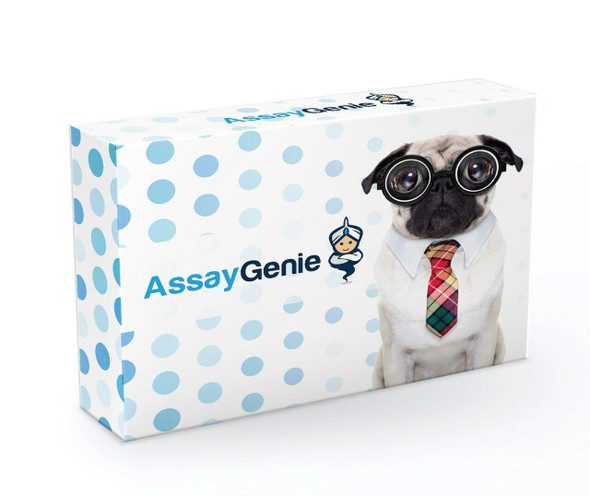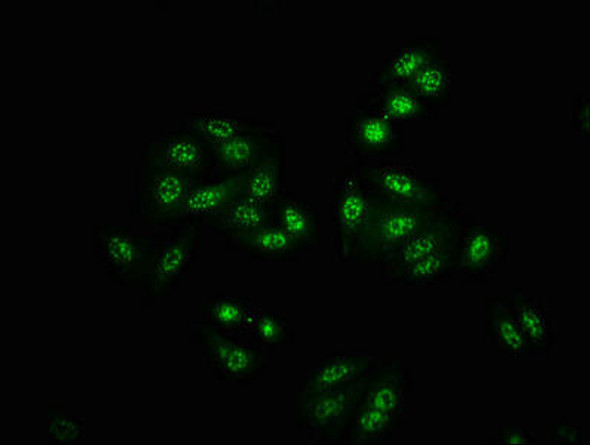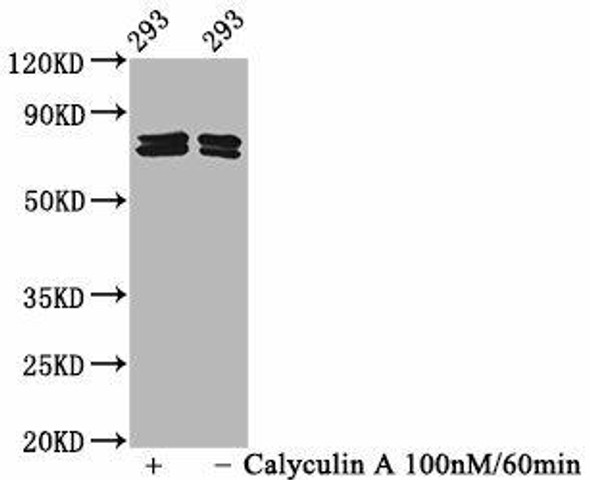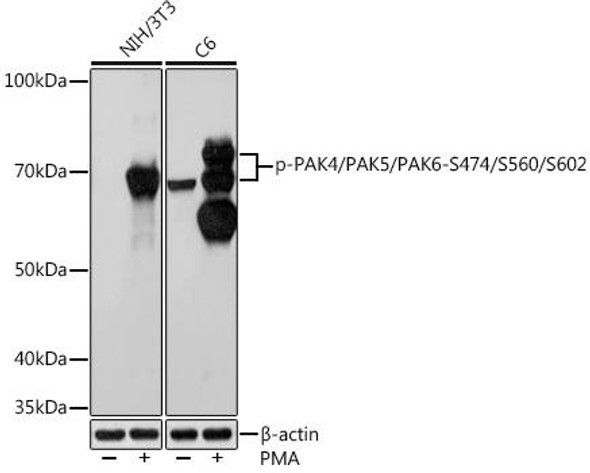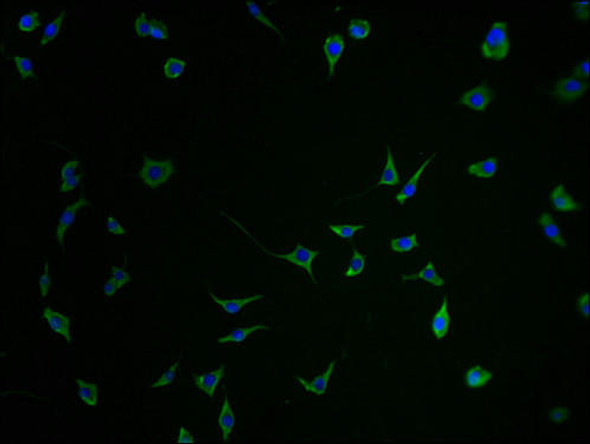PAK7/PAK6 Antibody (PACO03032)
- SKU:
- PACO03032
- Product Type:
- Antibody
- Reactivity:
- Human
- Mouse
- Host Species:
- Rabbit
- Isotype:
- IgG
- Applications:
- ELISA
- WB
- Antibody Type:
- Polyclonal Antibody
- Conjugation:
- Unconjugated
Description
PAK7/PAK6 Antibody (PACO03032)
The Pak7/Pak6 Antibody (PACO03032) is a high-quality polyclonal antibody designed for research involving Pak7 and Pak6, proteins that play essential roles in cell signaling pathways. This antibody, raised in rabbits, is specifically reactive with human samples and has been validated for use in various applications, including Western blotting.Pak7 and Pak6 are members of the p21-activated kinase (Pak) family, which are known to be involved in regulating cell proliferation, cell motility, and cytoskeletal dynamics. The Pak7/Pak6 Antibody binds to these proteins, enabling precise detection and analysis in a wide range of cell types.
This makes it an ideal tool for researchers studying cell signaling, cancer biology, and drug development.Understanding the functions and interactions of Pak7 and Pak6 is crucial for unraveling their roles in normal cell physiology and disease. With their involvement in oncogenic signaling pathways and potential as therapeutic targets, the Pak7/Pak6 Antibody is an invaluable resource for advancing research in areas such as cancer biology and drug discovery.
| Antibody Name: | PAK7/PAK6 Antibody |
| Antibody SKU: | PACO03032 |
| Size: | 50ug |
| Host Species: | Rabbit |
| Tested Applications: | ELISA, WB |
| Recommended Dilutions: | WB:1:500-1:2000 |
| Species Reactivity: | Human, Mouse |
| Immunogen: | synthesized peptide derived from human PAK5/6 around the non-phosphorylation site of S602/S560. |
| Form: | Liquid |
| Storage Buffer: | Liquid in PBS containing 50% glycerol, 0.5% BSA and 0.02% sodium azide. |
| Purification Method: | The antibody was affinity-purified from rabbit antiserum by affinity-chromatography using epitope-specific immunogen. |
| Clonality: | Polyclonal |
| Isotype: | IgG |
| Conjugate: | Non-conjugated |
| Synonyms: | PAK7; KIAA1264; PAK5; Serine/threonine-protein kinase PAK 7; p21-activated kinase 5; PAK-5; p21-activated kinase 7; PAK-7; PAK6; PAK5; Serine/threonine-protein kinase PAK 6; PAK-5; p21-activated kinase 6; PAK-6 |
| UniProt Protein Function: | PAK5: a protein kinase of the STE20 family. Predominantly expressed in brain. Capable of promoting neurite outgrowth, and thus may play a role in neurite development. Associated with microtubule networks and induces microtubule stabilization. Its subcellular localization is tightly regulated during cell cycle progression. |
| UniProt Protein Details: | Protein type:EC 2.7.11.1; Protein kinase, STE; Kinase, protein; Protein kinase, Ser/Thr (non-receptor); STE group; STE20 family; PAKB subfamily Chromosomal Location of Human Ortholog: 20p12 Cellular Component: mitochondrion; cytoplasm; nucleus Molecular Function:ATP binding; receptor signaling protein serine/threonine kinase activity Biological Process: cell proliferation; cell migration; apoptosis; cytoskeleton organization and biogenesis; locomotory behavior; learning; mitotic cell cycle; cell growth; signal transduction; protein amino acid phosphorylation; memory |
| NCBI Summary: | The protein encoded by this gene is a member of the PAK family of Ser/Thr protein kinases. PAK family members are known to be effectors of Rac/Cdc42 GTPases, which have been implicated in the regulation of cytoskeletal dynamics, proliferation, and cell survival signaling. This kinase contains a CDC42/Rac1 interactive binding (CRIB) motif, and has been shown to bind CDC42 in the presence of GTP. This kinase is predominantly expressed in brain. It is capable of promoting neurite outgrowth, and thus may play a role in neurite development. This kinase is associated with microtubule networks and induces microtubule stabilization. The subcellular localization of this kinase is tightly regulated during cell cycle progression. Alternatively spliced transcript variants encoding the same protein have been described. [provided by RefSeq, Jul 2008] |
| UniProt Code: | Q9P286 |
| NCBI GenInfo Identifier: | 12585290 |
| NCBI Gene ID: | 57144 |
| NCBI Accession: | Q9P286.1 |
| UniProt Secondary Accession: | Q9P286,Q5W115, Q9BX09, Q9ULF6, A8K5T6, D3DW14, |
| UniProt Related Accession: | Q9P286 |
| Molecular Weight: | 719 |
| NCBI Full Name: | Serine/threonine-protein kinase PAK 7 |
| NCBI Synonym Full Names: | p21 protein (Cdc42/Rac)-activated kinase 7 |
| NCBI Official Symbol: | PAK7 |
| NCBI Official Synonym Symbols: | PAK5 |
| NCBI Protein Information: | serine/threonine-protein kinase PAK 7; PAK-5; PAK-7; protein kinase PAK5; p21-activated kinase 5; p21-activated kinase 7; p21CDKN1A-activated kinase 7; serine/threonine-protein kinase PAK7 |
| UniProt Protein Name: | Serine/threonine-protein kinase PAK 7 |
| UniProt Synonym Protein Names: | p21-activated kinase 5; PAK-5; p21-activated kinase 7; PAK-7 |
| UniProt Gene Name: | PAK7 |
| UniProt Entry Name: | PAK7_HUMAN |


